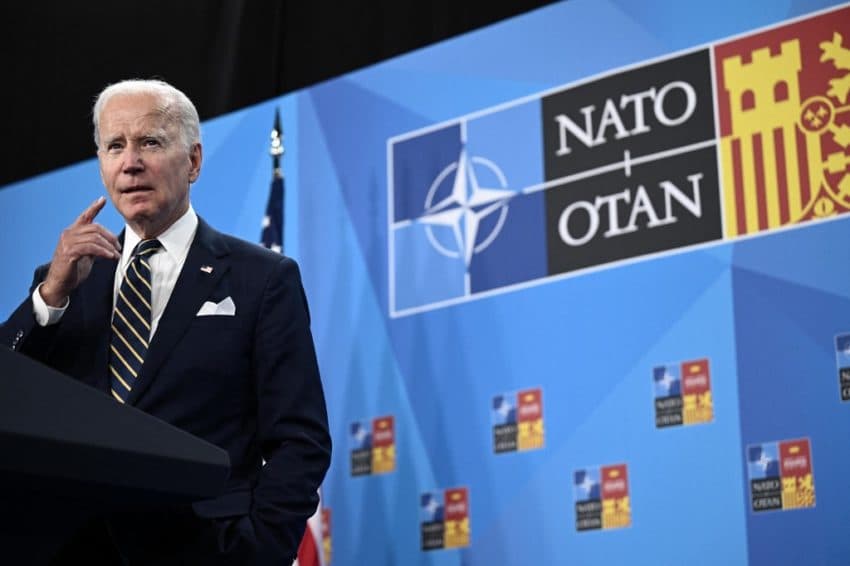Biden accidentally congratulates Switzerland on joining NATO

NATO's latest expansion momentarily got really interesting with even Switzerland about to join -- at least for a second in a Joe Biden verbal slip Thursday.
At a press conference marking the end of the NATO summit in Madrid, the US president recounted the behind-the-scenes talks putting militarily non-aligned Finland and Sweden on track to join the Western alliance in a major rebuff to Russia.
Joe Biden confuses Sweden with Switzerland: "We got on the telephone, he suggested we call the leader of, uh, of Switzerland. Switzerland! My goodness. I'm getting really anxious here about expanding NATO, of Sweden." pic.twitter.com/jEeW7QvpNs
— Real Mac Report (@RealMacReport) June 30, 2022
Except he misspoke, saying there was a plan to call the leader of famously neutral Switzerland about joining. Quickly realising his stumble, Biden said: "Switzerland, my goodness."
"I'm getting really anxious here about expanding NATO," he joked, before adding for the record: "Sweden."
Biden, 79, has long been known for his verbal gaffes during a political career spanning half a century.
How much is too much? Understanding Switzerland’s cooperation with NATO
Why isn't Switzerland in NATO?
NATO, an acronym for the North Atlantic Treaty Organisation, was created in 1949 as a response to the militarisation and expansion of the Soviet Union.
Two years earlier, a period known as the Cold War began — a state of conflict between western countries and the Soviet bloc that lasted for more than four decades.
NATO was formed in that geopolitical context to provide collective security against the rising threat posed by the Soviet Union.
Switzerland’s reason for not joining the military alliance at that time or since then was that such a move would be incompatible with the country’s longstanding tradition of neutrality — the same tradition that had kept Switzerland from joining the United Nations until 2002, and is still keeping it from joining the European Union.
EXPLAINED: Why isn’t Switzerland in NATO?
Specifically, what has kept Switzerland from becoming a member is the Article 5 of the NATO treaty — the principal of collective defence, implying that an attack on one member is viewed as an attack on all.
Switzerland’s principle of “armed neutrality” means the country can defend itself against an invasion, but it can’t engage militarily to defend other nations in an armed conflict.
Comments
See Also
At a press conference marking the end of the NATO summit in Madrid, the US president recounted the behind-the-scenes talks putting militarily non-aligned Finland and Sweden on track to join the Western alliance in a major rebuff to Russia.
Joe Biden confuses Sweden with Switzerland: "We got on the telephone, he suggested we call the leader of, uh, of Switzerland. Switzerland! My goodness. I'm getting really anxious here about expanding NATO, of Sweden." pic.twitter.com/jEeW7QvpNs
— Real Mac Report (@RealMacReport) June 30, 2022
Except he misspoke, saying there was a plan to call the leader of famously neutral Switzerland about joining. Quickly realising his stumble, Biden said: "Switzerland, my goodness."
"I'm getting really anxious here about expanding NATO," he joked, before adding for the record: "Sweden."
Biden, 79, has long been known for his verbal gaffes during a political career spanning half a century.
How much is too much? Understanding Switzerland’s cooperation with NATO
Why isn't Switzerland in NATO?
NATO, an acronym for the North Atlantic Treaty Organisation, was created in 1949 as a response to the militarisation and expansion of the Soviet Union.
Two years earlier, a period known as the Cold War began — a state of conflict between western countries and the Soviet bloc that lasted for more than four decades.
NATO was formed in that geopolitical context to provide collective security against the rising threat posed by the Soviet Union.
Switzerland’s reason for not joining the military alliance at that time or since then was that such a move would be incompatible with the country’s longstanding tradition of neutrality — the same tradition that had kept Switzerland from joining the United Nations until 2002, and is still keeping it from joining the European Union.
EXPLAINED: Why isn’t Switzerland in NATO?
Specifically, what has kept Switzerland from becoming a member is the Article 5 of the NATO treaty — the principal of collective defence, implying that an attack on one member is viewed as an attack on all.
Switzerland’s principle of “armed neutrality” means the country can defend itself against an invasion, but it can’t engage militarily to defend other nations in an armed conflict.
Join the conversation in our comments section below. Share your own views and experience and if you have a question or suggestion for our journalists then email us at [email protected].
Please keep comments civil, constructive and on topic – and make sure to read our terms of use before getting involved.
Please log in here to leave a comment.